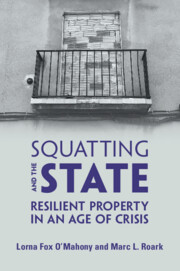Book contents
- Squatting and the State
- Squatting and the State
- Copyright page
- Dedication
- Contents
- Preface and Acknowledgments
- Introduction Squatting, Scale, and the State
- Part I Squatting and the State
- 1 States, Narratives, and Norms
- 2 Squatting and the Law
- 3 Property Theory and the State
- 4 Scaling the State
- Part II Resilient Property in an Age of Crises
- Part III Resilient Property in Action
- Bibliography
- Index
2 - Squatting and the Law
from Part I - Squatting and the State
Published online by Cambridge University Press: 11 August 2022
- Squatting and the State
- Squatting and the State
- Copyright page
- Dedication
- Contents
- Preface and Acknowledgments
- Introduction Squatting, Scale, and the State
- Part I Squatting and the State
- 1 States, Narratives, and Norms
- 2 Squatting and the Law
- 3 Property Theory and the State
- 4 Scaling the State
- Part II Resilient Property in an Age of Crises
- Part III Resilient Property in Action
- Bibliography
- Index
Summary
The options available to states to respond to squatting, including through law, are wide-ranging, sometimes dynamic and always revealing of the complex relationships between land, housing and shelter, poverty and ownership, citizenship and exclusion in each jurisdiction, in particular moments. The legal tools adopted and applied in response to squatting vary by jurisdiction (and within jurisdictions, by level of state action, for example, local vs national), and over time. In this chapter we introduce key elements within legal responses to homeless squatting in each of five jurisdictions that we draw on to inform our analysis throughout the book: Ireland, England and Wales, South Africa, Spain and the United States of America. In drawing examples and illustrations from a range of diverse jurisdictions, we aim to follow the advice of Van der Walt and Walsh, to pay: “…close attention to jurisdictional differences, and to broader social, economic and cultural considerations not always apparent from the face of constitutional texts, legislative provisions or even judicial decisions.” Our aim in this chapter is to set out the “legal base-line” for the book, locating these laws in their historical, geographical and social context. In doing so, we introduce an array of potential legal responses to squatting: including regularization of unlawful occupation (enabling the squatter to acquire rights in land), and a range of civil actions and criminal sanctions targeted at unlawful occupiers or absent owners.
Keywords
- Type
- Chapter
- Information
- Squatting and the StateResilient Property in an Age of Crisis, pp. 90 - 142Publisher: Cambridge University PressPrint publication year: 2022

